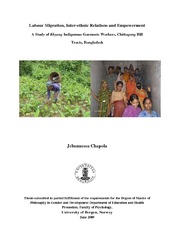Labour Migration, Inter-ethnic Relations and Empowerment : A Study of Khyang Indigenous Garments Workers, Chittagong Hill Tracts, Bangladesh
Master thesis
Permanent lenke
https://hdl.handle.net/1956/3524Utgivelsesdato
2009-06-02Metadata
Vis full innførselSamlinger
- Faculty of Psychology [527]
Sammendrag
There has been a growing trend among the Khyang indigenous people of Chittagong Hill Tracts (CHT), Bangladesh to migrate from their traditional occupation (Jhum cultivation) and take up new occupations (mostly garments factory work) in the big cities. These changes have led to critical shifts in the social and gender relations, institutions of the indigenous people and in the Khyang indigenous women's empowerment. Using my research in the Chittagong Export Processing Zone (CEPZ) and Chittagong Hill Tracts which are situated in the south-eastern part of Bangladesh, I juxtapose Khyang indigenous garment workers' experience in the new city environment to understand their challenges in their living arrangements, work place and social life in the city compared to their life in the villages. These indigenous people move from a semi-egalitarian society to a capitalist patriarchal society. In the thesis, it is argued that Khyang indigenous women have challenged and renegotiated complex interethnic interactions within their work place, housing compounds and new forms of living arrangement through their involvement in paid labour. The thesis also articulate that my Khyang informant’s access to wage labour may improve their existing position in their home communities and increase their chances for better and delayed marriages. It may also enable them to raise their voice in family decision making and encourage their questioning of unequal practices and ethnic discrimination. In addition, it can increase their sense of self reliance and bargaining power. Despite the wage earning and the subsequent empowerment of Khyang women, there are, however, several negative aspects of their migration into city and the life worlds of garments factories. Firstly, their participation in garment’s work is not always well regarded by people in their home communities. Moreover, the working conditions in the garment’s factories are not safe and healthy and they experience stereotyping and ethnic discrimination from the majority society due to their different language, accents, religion, food and dress . The latter may be minimized if cross cultural communication in city life, working places and housing is improved. Moreover, if wage, working and living conditions can improve for factory workers then it would be possible to increase the social acceptance for Khyang indigenous women which could possibly challenge the majority Bengali mainstream culture.
Beskrivelse
This is a corrected version related to spelling and abstract(october 2009).
Utgiver
The University of BergenOpphavsrett
Copyright the author. All rights reservedThe author
